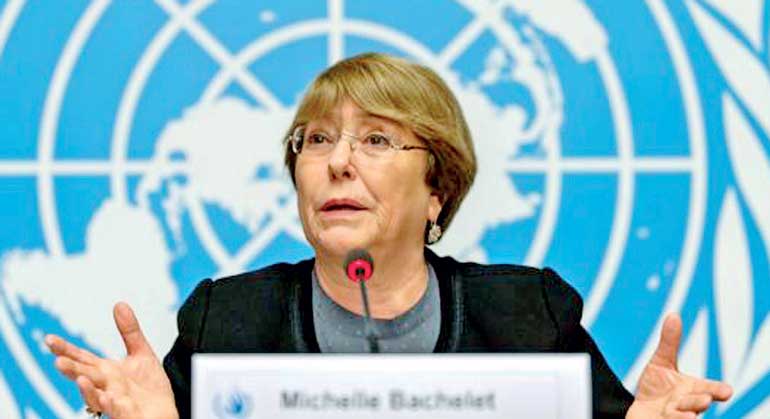Monday Feb 16, 2026
Monday Feb 16, 2026
Tuesday, 21 September 2021 00:00 - - {{hitsCtrl.values.hits}}

As a former President, and (earlier) Defence Minister of Chile, UN High Commissioner for Human Rights Michelle Bachelet is most likely to understand the difficulties faced in this endeavour by the Government, but having been a victim of torture herself, and one who lost her Air Force General father to torture, she would also be the most sincerely concerned for victims deserving of justice
|
 While the UN High Commissioner for Human Rights, the former (Socialist) President of Chile, Michelle Bachelet was on many Sri Lankan minds, with a trace of apprehension as the September 2021 session of the UNHRC began on the 13th, it was soon made clear following her presentation that the feeling was mutual and Sri Lanka had been very much on Michelle Bachelet’s mind. She spent around eight minutes of her oral update on Sri Lanka.
While the UN High Commissioner for Human Rights, the former (Socialist) President of Chile, Michelle Bachelet was on many Sri Lankan minds, with a trace of apprehension as the September 2021 session of the UNHRC began on the 13th, it was soon made clear following her presentation that the feeling was mutual and Sri Lanka had been very much on Michelle Bachelet’s mind. She spent around eight minutes of her oral update on Sri Lanka.
By the 14th, at the interactive dialogue, it became clear it wasn’t love. Responses to her update by the Minister of Foreign Affairs, the Sri Lankan Ambassador/Permanent Representative in Geneva and later the Secretary of Foreign Affairs hovered around the same theme. She had shamelessly exceeded her mandate. A romance was never possible.
Professor G.L. Peiris rejected her proposal with vehemence, claiming that “external initiatives purportedly established by Resolution 46/1 while domestic processes are vigorously addressing the relevant matters”. A little exaggeration about “vigour” is permitted in these affairs, surely. However, with her attention fixed on Sri Lanka for some time now, she wasn’t going to take it at face value, especially since the process has been on-again and off-again for far too long to lend credence to the claim.
Rejection
The Sri Lankan PR quoted the founding resolution of the UNHRC 60/251of 2006, and UNGA Resolution 48/141 of 1994 creating the post of the UN High Commissioner for Human Rights to emphasise that the UNGA had never authorised the High Commissioner to collect “criminal evidence for use in judicial proceedings”. His outrage was to be expected. The basis of a relationship has to be negotiated. These were the founding documents setting out the principles, working methods, etc. of the Institutions. The Institutions are meant to stand by them, in all their work.
Never mind that the UNHRC has since mandated a number of Commissions of Inquiry (COIs), a recent example being Resolution 39/2 of 2018 on Myanmar “mandated to collect evidence of the most serious international crimes and violations of international law and prepare files for criminal prosecution”, Fact Finding Missions (FFMs) e.g. on Libya by resolution 43/39 of June 2020, and Resolution 31/20 on South Sudan in 2016 setting up a Commission on Human Rights (CoHR) to determine “the facts and circumstances of, collect and preserve evidence of, and clarify responsibility for alleged gross violations and abuses of human rights and related crimes, including sexual and gender-based violence and ethnic violence, with a view to ending impunity and providing accountability.” There are other similar mechanisms, also recently, on Israel, Belarus, Yemen, Burundi and Syria, to name a few.
All of these were mandated by the UNHRC through HRC resolutions. Every year, the High Commissioner’s Office presents its annual report to the UN General Assembly. All of the above gets included in the Report. None of the mechanisms has been reversed as a result of a UNGA objection.
In fact, UNGA Resolution 65/281 on Review of the Human Rights Council 17 June 2011, states:
“Decides to consider through its Fifth Committee all financial implications emanating from the resolutions and decisions contained in the annual report of the Human Rights Council…
Recognises the need to provide adequate financing to fund unforeseen and extraordinary expenses arising from resolutions and decisions of the Human Rights Council…”
Let’s not forget Resolution 25/1 on Sri Lanka in March 2014, to “undertake a comprehensive investigation into alleged serious violations and abuses of human rights and related crimes by both parties in Sri Lanka during the period covered by the Lessons Learnt and Reconciliation Commission (LLRC), and to establish the facts and circumstances of such alleged violations and of the crimes perpetrated with a view to avoiding impunity and ensuring accountability, with assistance from relevant experts and special procedures mandate holders”. That one was adopted with 23 votes of the UN Human Rights Council.
All is not lost however. Sometimes others like uncles and aunts have to get involved in order to sort things out. Fortunately Sri Lanka has a representative at the UNGA. All that our Permanent Representative to the UN in New York (a former Chief Justice) has to do, is to intervene to make evidence-based objections to this proposal. Based on how many member states are convinced by his objections, he may just get this whole thing reversed, clarifying the limits of the UNGA-UNHRC-GoSL relationship in the process.
The proposal
What did the High Commissioner’s oral update actually highlight? The current conduct of this administration took up most of the space. As for the past, the High Commissioner seemed to be willing to settle for “emblematic” cases. And some of those cases we couldn’t possibly pretend were legitimate, especially since an earlier gathering of elders had declared they should be thoroughly investigated as in the LLRC Report. We will make no headway if we continue to sound like an errant teenager screaming “I am doing it!”
High Commissioner Bachelet indicated they had 120,000 individual pieces of evidence, which they have acquired from existing UN archives. If those include the Darusman Panel’s archives, the authors themselves declared in their report that the evidence had not been verified. When the GoSL asked to see the evidence obtained by the Darusman panel, they were denied it on the basis of confidentiality. Therefore, refuting them is impossible. However, the new repository is likely to call for new evidence to complete its task.
The UN has strict guidelines for mandated investigations. These are discussed at length in a 2018 OHCHR publication called ‘Who’s Responsible? Attributing Individual Responsibility for Violations of International Human Rights and Humanitarian Law in United Nations Commissions of Inquiry, Fact-Finding Missions and other Investigations’.
It is most likely that the ongoing gathering of information for the repository will be guided by such documents, which acknowledges the inherent challenges: “Yet identifying responsible parties poses complex legal and methodological challenges. Should human rights investigative bodies publicly identify those responsible, i.e., name them individually in the report? What of the right to a presumption of innocence? Or is it sufficient to identify a party, group or organisational unit as responsible? Should the investigation identify only those “most responsible,” or all alleged perpetrators? If not naming publicly, what purpose does the identification fulfil? May a CoI share its information on individuals it believes to be responsible? If so, with whom, when and under what circumstances?”
As for criminal investigations arising from such gathering of information, the publication discloses that: “Depending in large measure on the circumstances of the crimes and violations recorded, information collected during human rights investigations may facilitate criminal prosecutions. In Côte d’Ivoire, Kenya, Guinea, Darfur and Libya, for example, CoI information was used at the International Criminal Court and in regional human rights courts to support factual and legal positions or to trigger investigations.”
Conduct unbecoming?
What of current conduct? The High Commissioner mentioned the victims of the Easter Sunday bombing of 2019, who “continue to call urgently for truth and justice”. Hejaaz Hizbullah, a Supreme Court Lawyer is either victim or perpetrator, still in jail nearly a year and a half since his arrest and recently indicted. While he waits, he has been declared a “Prisoner of Conscience” by Amnesty International. AI is pretty big at the UN Human Rights Council.
There are accusations of coercion of children in obtaining evidence against Hizbullah, some of which have since been retracted. It has been said at a high official level that the delay in presenting the case is due to it being made watertight, since any little error could find the whole thing thrown out. The authorities say they are 100% certain he is guilty. This is hardly the common man’s view and the delays in bringing the case to court aren’t helping to convince them otherwise.
The High Commissioner also mentions poet Ahnaf Jazeem “detained without charge since May 2020”. What’s the delay with that? A dangerous poet. What could be more frightening! She also mentions “…increased surveillance, intimidation, judicial harassment has broadened to students, academics” and “…arrests and detention of demonstrators in quarantine centres”. Some of this we see often on the evening news. It’s not a good look.
One of Bachelet’s repeated remonstrations is what she calls in her oral update “the corrosive impact of militarisation.” The Government rejects this. It appears that they reject both that there is ‘militarisation’ and that it is ‘corrosive’. For over a year now, the head of the anti-COVID 19 Task Force has been the Army Commander. Doctors and civil activists have been suggesting that a medical professional, a virologist, or similar expert would be better suited for the role. This is self-evident since the primary instinct of medical professionals is to save all lives and they are trained to organise themselves into doing this.
When the medical advice was given to the Task Force to begin vaccination with over-60s, they knew they were trying to save the lives of the most vulnerable group in the population. Would this instruction have been changed to prioritise over-30s, by such a person? I daresay it took a non-medical person to do so. The folly of this decision didn’t take long to unfold. By far the largest percentage of deaths due to COVID-19 was among the over-60s. This is not to take away from the brilliant vaccination drive conducted by the military acting in a supportive role for which they were eminently qualified.
Keep the promise
There is no indication that Sri Lanka can stop Resolution 46/1 from being implemented and an information repository of the OHCHR being established. It has been properly mandated and voted by a majority of the membership of the UN Human Rights Council. Further, a few states or civic groups may be tempted to use Universal Jurisdiction to initiate proceedings against individual perpetrators, utilising the evidence gathered by the OHCHR.
This may be pre-empted by actualising the promise made by Sri Lanka, restated in the High Commissioner’s oral update as “committed to work with the UN to ensure accountability”. Since Sri Lanka rejects external interference, it is in its best interest to begin work on the emblematic cases as previously agreed upon and recommended by Sri Lanka’s own Commissions of Inquiry, such as the LLRC and the Paranagama Commission.
As a former President, and (earlier) Defence Minister of Chile, this Human Rights High Commissioner is most likely to understand the difficulties faced in this endeavour by the Government, but having been a victim of torture herself, and one who lost her Air Force General father to torture, she would also be the most sincerely concerned for victims deserving of justice.